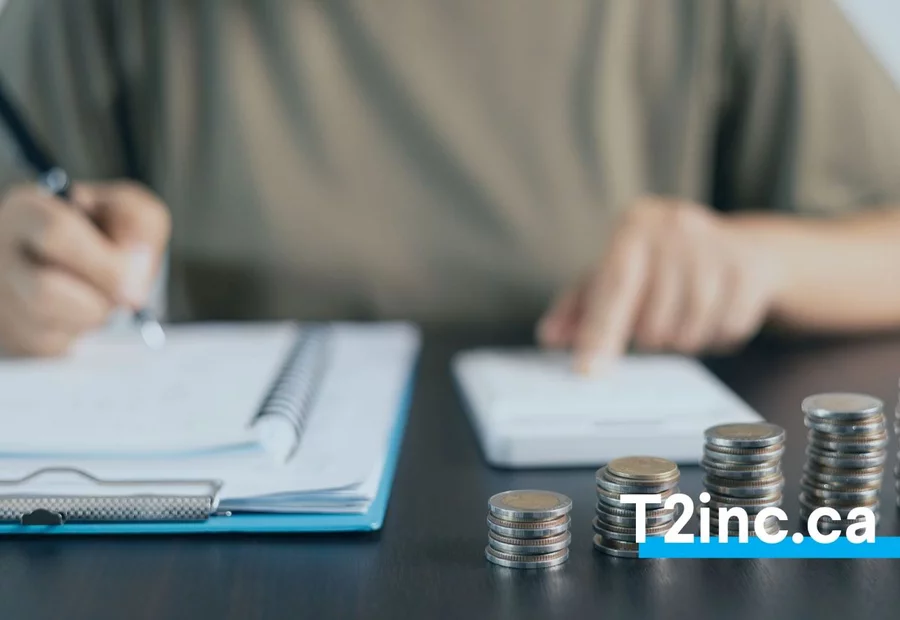Salary versus dividends: What's the best way for a business owner to pay less tax in Canada?

If you're a small business owner, deciding whether to pay yourself a salary, a dividend, or a combination of the two is a strategic decision. This decision affects not only your immediate net income, but also your long-term tax planning and eligibility for various social programs.
In this article, you will discover the pros and cons of paying yourself with these options, as well as the best strategies for optimizing your compensation while reducing your income tax.
Which is better, salary or dividends?
If you're looking for financial stability and plan to apply for a mortgage or loan, a steady salary is better. If your goal is to keep more money in your business and reduce personal tax, paying yourself via dividends may be more beneficial. The best option will depend on your business and personal financial goals and circumstances.
Pros and cons of paying yourself a salary
What is a salary?
A salary is an amount paid in return for work performed by an individual under an employment contract. For the company, salary is a business expense recorded as an expense in its financial statements, reducing its taxable income. For the entrepreneur, the salary represents a stable and predictable payment option, ideal for guaranteeing a regular income and benefiting from certain social advantages.
Why choose a business wage?
Paying yourself a salary is an advantageous option for business owners who want to ensure a stable income while enjoying numerous financial and tax benefits. A salary allows you to contribute to important social programs such as the Canada Pension Plan (CPP), the Québec Pension Plan (QPP), or the Québec Parental Insurance Plan (QPIP). It also opens the door to tax deductions for expenses such as child care and allows you to contribute to an RRSP, a valuable retirement planning tool. A regular fixed salary strengthens your financial credibility with banks, making it easier to obtain mortgages or financing for your projects. What's more, having gross salary and CRA remittances deducted directly from each paycheck simplifies the management of your business and personal finances, reducing the risk of surprise tax bills at the end of the year.
For the company, a salary also serves as a business deduction that reduces income tax obligations. In this way, it helps reduce the company's tax burden while providing a stable income for the business owner.
Disadvantages of earning a business salary
Despite its advantages, a salary can be less advantageous in certain respects. For the business owner, the main disadvantage is the higher tax rate. In Quebec, this rate can reach almost 50% for the highest incomes, which reduces the tax efficiency compared to dividends. This means that a significant portion of your gross salary goes to income tax, which can limit your available cash.
For the company, paying a salary can be less flexible than paying dividends. This compensation must be paid on a regular basis, even if the company's profits fluctuate. This rigidity can be a challenge for start-up companies or those with unstable profits. What's more, paying a salary creates additional administrative obligations, such as registering a payroll account with the Canada Revenue Agency (CRA) and Revenu Quebec. The company must also manage withholding taxes such as QPP, employment insurance, and income tax contributions. This adds administrative complexity and indirect costs.
Pros and cons of paying yourself dividends as an executive?
What is a dividend?
A dividend is a portion of a company's net income that is distributed to shareholders. Unlike a salary, it is not considered a business expense and does not directly affect the company's taxable income. This distinction makes it a fiscally attractive form of dividends in certain situations.
There are several types of dividends, such as eligible dividends and non-eligible dividends, of which the following are the most common:
- Eligible dividends: paid from income that does not qualify for the Small Business Deduction (SBD).
- Non-eligible or ordinary dividends: paid from income that qualifies for the SBD.
- Nontaxable capital dividends: these dividends, often from returns of capital, are not subject to tax and require a capital dividend account.
- Property dividends or stock dividends: these dividends paid in stocks or property are not in cash but in the form of property or shares.
Why do you choose to pay yourself a dividend?
Paying yourself dividends is a tax-efficient and easy-to-manage solution for business owners seeking to maximize profits while providing flexible compensation. From a tax perspective, dividends are better as they benefit from a dividend tax credit that reduces their tax rate compared to salary. This difference can represent significant savings for shareholders, making this form of compensation particularly advantageous for optimizing personal income tax.
Administratively, dividends are also simpler to handle. Unlike paying yourself a salary, dividends don’t require a payroll account or the administration of periodic tax deductions. Instead, dividends are declared and transferred directly from the company's account to the shareholder, reducing overhead.
Finally, dividends offer flexibility. Payments can be adjusted according to the company's performance, allowing for better management of business and personal finances.
Tax and administrative restrictions on dividends
Unlike salaries, dividends are not deductible for corporate income tax purposes. This means that the profits used to pay dividends are taxed at the company level before being subject to shareholder taxation. This double taxation can reduce the overall tax efficiency of this option, especially for companies with high profits. Dividend payments also involve specific administrative obligations. Each year, the company must issue T5 forms to all shareholders who have received dividends. This administrative requirement can be burdensome, especially for small companies that do not have sufficient internal resources to manage these documents.
Another major disadvantage of dividends is the absence of contributions to social programs such as the Quebec Pension Plan (QPP) and Employment Insurance. For executives, this means that they do not accumulate entitlements for their retirement or for certain support programs, which can affect their long-term financial security.
Finally, although dividends are generally taxed at a lower rate than salaries, their tax rate can vary depending on the type of dividend paid and the shareholder's overall income. This variability can sometimes limit the expected tax savings, particularly for shareholders in higher tax brackets.
Combining salary and dividends: The best way to pay less tax?
For executives of Canadian-controlled private corporations (CCPCs) with revenues of less than $500,000, a blended compensation strategy combining salary and dividends can offer significant tax advantages. This approach allows you to take advantage of the lower small business tax rate while optimizing your personal taxes.
Given the complexity of the tax laws and how they vary from province to province, we recommend that you consult with a tax professional such as those at T2inc.ca. With our Salary vs. Dividend Consultation, we can perform a personalized analysis of your situation and advise you on the best combination of salary and dividends. Our goal is to optimize your tax situation while meeting your financial needs and personal goals.
The benefits of blended compensation
A blended strategy that combines salary and dividends offers significant tax and financial benefits. From a tax perspective, the salary allows the company to reduce its taxable income because it is considered a deductible expense. This reduces corporate taxes while allowing the executive to contribute to social programs such as the Quebec Pension Plan (QPP) and Employment Insurance, thereby strengthening his or her long-term financial security. In addition, dividends offer a significant tax advantage through the associated tax credit, which reduces the tax rate relative to salary. This combination minimizes the total tax paid by both the company and the executive.
Financially, this approach provides great flexibility. Dividends can pay variable amounts based on profits, while salary provides a stable, predictable income. This flexibility is particularly useful for meeting immediate financial needs while adjusting to the company's performance.
Factors to consider
Before adopting such a strategy, it's important to assess your personal income and liquidity needs to determine the ideal balance between salary and dividends. These needs will also affect your pension contributions, as only salary will allow you to contribute to the QPP and build up Registered Retirement Savings Plan (RRSP) room, which is essential for planning your financial future.
Finally, it's important to analyze your overall tax situation, including the impact of income on personal taxes and government benefits such as family allowances or tax credits. A balanced strategy will optimize these various aspects while meeting your financial goals.
Choose salary vs dividends: let us help you make the best choice
Paying yourself a salary vs a dividend is a strategic decision that has a direct impact on your net income, tax planning and long-term financial security. Each option offers benefits that vary depending on your personal situation and business goals.
At T2inc.ca, we understand that every business owner is unique. That's why we want to offer a complete service for small and medium-sized businesses with consultations or the filing of T2 form and CO-17 returns for your corporate taxes in Canada.
Contact us today and let us help you develop a financial strategy tailored to your ambitions. Together, we'll find the ideal solution for you and your business.
Contact our experts
Have a question? Need help? Fill out our online form to get help from our experts.
Contact usNeed more help?
Contact us by filling out our form
Are you interested in our services, but would like more information before taking the plunge? Contact us today and one of our tax accountants will be in touch to help you.
At T2inc.ca, we're committed to helping business owners manage their company's tax affairs so they can grow their business.




